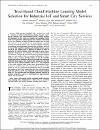Trust-Based Cloud Machine Learning Model Selection for Industrial IoT and Smart City Services
Date
2021-02-15Metadata
Show full item recordAbstract
With machine learning (ML) services now used in a number of mission-critical human-facing domains, ensuring the integrity and trustworthiness of ML models becomes all important. In this work, we consider the paradigm where cloud service providers collect big data from resource-constrained devices for building ML-based prediction models that are then sent back to be run locally on the intermittently connected resource-constrained devices. Our proposed solution comprises an intelligent polynomial-time heuristic that maximizes the level of trust of ML models by selecting and switching between a subset of the ML models from a superset of models in order to maximize the trustworthiness while respecting the given reconfiguration budget/rate and reducing the cloud communication overhead. We evaluate the performance of our proposed heuristic using two case studies. First, we consider Industrial IoT (IIoT) services, and as a proxy for this setting, we use the turbofan engine degradation simulation data set to predict the remaining useful life of an engine. Our results in this setting show that the trust level of the selected models is 0.49%-3.17% less compared to the results obtained using integer linear programming (ILP). Second, we consider smart cities services, and as a proxy of this setting, we use an experimental transportation data set to predict the number of cars. Our results show that the selected model's trust level is 0.7%-2.53% less compared to the results obtained using ILP. We also show that our proposed heuristic achieves an optimal competitive ratio in a polynomial-time approximation scheme for the problem.
Collections
- Computer Science & Engineering [2489 items ]


